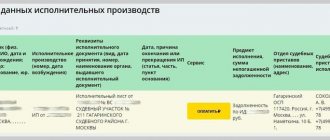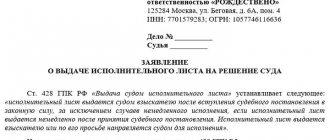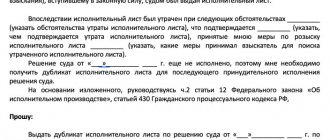The natural result of any case that is referred to the court is the announcement of a decision by the judge. As soon as it is formalized, as required by law, and receives legal force, you can begin to implement it. How to obtain a writ of execution based on a court decision in a civil case in 2021?
The algorithm of actions is as follows: wait for the court decision to enter into force, write an application for the issuance of a writ of execution, receive the document in hand and submit it to the civil service, whose employees will begin enforcement.
Why do you need a writ of execution?
A defendant who has lost a case does not always strive to fulfill the obligations imposed on him by the court as quickly as possible. The dispute has been resolved, a decision on it, and it is mandatory for both organizations and citizens. But for various reasons there is no real implementation.
This is precisely what the enforcement service, the FSSP, is intended for. A solution alone is not enough; another document is needed. Based on it, as well as the claimant’s application, the bailiff will open a case and begin to perform his official duties. They are to ensure proper execution.
In what cases is it necessary?
If the court applied the claim procedure, then the logical conclusion of the process will be a decision. There is another judicial procedure, it is called a writ. Its distinctive feature is that the application is considered within several days. In this case, participants in the process are not invited to participate in the meeting.
Based on the results of the consideration, the magistrate (it is within his competence to issue court orders) will draw up the necessary document, and then send it to interested parties.
The court order immediately acquires the force of an executive document. Accordingly, there is no need to go with him to receive the document in question. It is precisely one order that should be submitted to the FSSP.
State duty amount
The state fee when sending a complaint to the appellate court is set at half the amount of the state fee, which is paid when initially filing a non-property claim.
In this case, claims of a non-property nature require payment (Article 333.19 of the Tax Code of the Russian Federation):
- 300 rub. for individuals (when filing a complaint, exactly half is paid - 150 rubles);
- 6,000 rub. for legal entities (when sending a complaint, half is paid - 3,000 rubles).
What should I do to receive it?
Even if the judge announced his decision and formalized it in writing, it does not immediately enter into force. Sometimes you have to wait quite a long time for the reason that the losing party did not accept defeat and began to challenge the judicial act. If so, then the appeal stage will begin.
A certain period of time is allotted for it, equal to 30 days. If there is no complaint, then after this period the decision acquires legal force. This means that it’s time to go to the civil affairs office and get a collection sheet there.
Reasons for issuing a copy of a court order
The main basis for receiving a document with a judge’s verdict is a completed application for the issuance of a court order. It can be drawn up by any participant in a particular process. The following cases may be considered as reasons for obtaining a certificate:
- The intention of the parties to challenge the judge’s decision in higher courts by filing an appeal or cassation complaint with the relevant institutions.
- Delivery of a completed resolution for subsequent execution. For example, transferring it to the bailiff service.
Who has the right to receive a copy of a court decision?
According to article number 214.1, the following persons can receive a court order:
- Participants in the trial: applicant, defendant, witnesses, prosecutor.
- Trustees or authorized representatives, for example the plaintiff's lawyer.
What to do if a complaint is filed?
Within the above period, a citizen or organization, if they have lost the case, can file a complaint. If you miss it, the submitted complaint will not be accepted by a higher court. If the other party wants to restore the deadline, then it will have to submit a written request along with the complaint.
The party that won the case will be asked by the court to submit its objections to the complaint. It is not necessary to do this; the law does not impose such an obligation on the participant in the process.
But if there is a desire to object to the arguments set out in the complaint, it makes sense to do so. There are no special requirements for the preparation of such a document. This means that it is compiled in any form. It is enough to familiarize yourself with the appeal and indicate which arguments of the opposing party should not be taken into account by the court.
The higher court has two options:
- Refuse the applicant and leave everything in effect
- Recognize the complaint as justified, cancel the decision and make a new one.
The verdict of the appellate court is formed in the form of a ruling, and it immediately becomes binding. If the initial decision here stands, or, as lawyers say, “is overpowered,” then you can receive the long-awaited document.
What should be included in such a statement?
In the law of the Russian Federation there are no specific requirements for drawing up and submitting a petition, but some are general and widespread. The text should contain:
- contact details of the applicant (in full),
- number of the case that was considered,
- the name of the court where the petition will be sent,
- Full name of the person applying,
- Last name with first name and patronymic of the judge who conducted the trial,
- specific data on the case (in its entirety),
- meeting date,
- justification for the purpose of requesting copies,
- the email address where copies are supposed to be sent,
- date of the application,
- signature from the applicant.
Sample
Download
Sample application for a copy of a court decision in a civil case.doc
How to obtain a writ of execution based on a court decision in a civil case
The final completion of the judicial stage makes it possible to obtain the required paper. It is issued by the judicial authority that initially considered the civil case. This is where you need to go.
The office will ask you to fill out an application. It can be written by hand right there in the court office. It looks something like this:
The application must indicate:
- Name of the court that heard the case
- Data of the parties involved in the process
- An indication that the defendant refuses to comply with the decision voluntarily
- Please issue an executive document.
Within a few days, the requested document can be received in your hands. The law does not clearly define the time frame when a request for extradition must be executed. A few days is common practice. If the case is clearly dragging on, then it is advisable to write a complaint to the chairman of the district court. The Supreme Court, considering a dispute over the issuance of a document, indicated that the time frame for providing it to the applicant must be reasonable.
It is advisable to immediately check whether all the data is presented correctly; in particular, you should pay attention to:
- personal data of the plaintiff and defendant (full name, place of birth and residence, residential address).
- compliance of the information in the writ of execution with the court decision (for example, case number, dates, amount of the amount collected)
- availability of mandatory details (court seal, judge’s signature)
Errors and inaccuracies may adversely affect the further execution of a judicial act. If any errors are noticed, you need to report this to a court clerk. To hand over the document, the applicant must sign the registration documents.
Cancellation of a verdict in a criminal case
Important! An appeal in a criminal case is filed when the verdict has not yet entered into force. If the verdict becomes legal, the only option left is a cassation appeal.
The document is addressed to the judicial authority from the list mentioned in Article 401.3 of the Code of Criminal Procedure of the Russian Federation.
Any person participating in the trial has the right to file an appeal. However, this will not necessarily be the party accused of the crime. Even if the defendant is acquitted, the latter has the right, for personal reasons, to appeal the verdict if he wants to do so.
The law allows you to file an appeal even when the deadline for filing it has expired. However, in this case, for its acceptance by the judge, the presence of significant grounds will be required, which will be regarded as valid.
How to present a document to the bailiff?
Everyone knows that you need to take the document to the bailiff department. However, you should know that the case can only be opened at the debtor’s place of residence. As a rule, this place is determined based on the registration data of the debtor citizen.
One sheet is not enough. The law obliges the claimant to submit a statement along with this document. There are also no requirements for its preparation. You just need to indicate:
- sheet details,
- what court released him
- bank details for money transfers
- a request to the bailiff to initiate a case
Within three days of such an application being received, it will be transferred to the bailiff for work. The bailiff, having examined the submitted documentation, must again decide within three days whether to initiate a case or refuse.
If everything is in order with the documents, the deadline for presentation has not expired, then a positive decision will definitely be made. It takes the form of a resolution. The document itself goes into the case, and its copies are sent to the debtor and the person who demands execution of the court decision.
Settlement agreement and missing documents: practice of the Moscow District AS
The world is not for everyone
In the bankruptcy case of Yuzh-Torg LLC, the Arbitration Court of the Moscow District touched upon the problem of “exclusive” settlement agreements.
In 2021, ASGM began bankruptcy of the company using a simplified procedure. The register included “Prodmaster” with a 585 million dollar claim and “Ice-Market”, to which the bankrupt owed 402,000 rubles. At the beginning of 2021, these creditors at a meeting decided to conclude a settlement agreement with Yuzh-Torg. The court approved it and terminated the proceedings, and Yuzh-Torg continued to exist.
Debtor's settlement agreement: when will the creditor challenge it?
The Federal Tax Service did not agree with this. At the time of applying to the court for approval of the settlement agreement, the tax authorities stated their demand for 600 million rubles. to the debtor. This happened at the end of 2019, but Judge Ekaterina Ignatova then decided to wait until the tax inspection decisions came into force. Due to a legal challenge, this issue was delayed, and the creditors managed to reach an agreement with Yuzh-Torg.
The district court prohibited the dismissal of a case due to a settlement agreement if the case contains stated but not yet considered claims of other creditors. After all, such an agreement directly affects the rights of creditors who did not intend to reconcile with the debtor or, in principle, did not have such an opportunity. The “troika” of judges also noted that such a settlement agreement allows one to postpone the period of suspicion for challenging the debtor’s transactions and can be used to avoid challenging agreements in a new bankruptcy case (case No. A40-182353/2019).
The interests of the creditor and debtor do not coincide
In the bankruptcy case of Artex LLC, creditor Robert Zorin challenged several of the debtor's pre-bankruptcy transactions with bills. He won the argument. Artex's counterparties, parties to the agreements, filed complaints against the decision in the case, but to no avail (case No. A40-215298/2016).
Expensive process: how to recover legal costs
Zorin calculated how much he spent on the participation of lawyers in meetings on this separate dispute, and asked ASGM to recover 206,000 rubles from Artex. Two authorities refused. The courts agreed that Zorin acted in the interests of the debtor, and the judicial acts themselves were actually adopted in favor of Artex, because its bankruptcy estate was replenished. At the same time, the courts added that the costs in the appellate and cassation instances are not due to the procedural behavior of the debtor, because the complaints were filed not by the bankruptcy trustee of Artex, but by the counterparties to the disputed transactions.
The Moscow District Court did not agree with the lower courts and decided that the costs should be compensated. Court costs are subject to reimbursement by those parties not in whose favor the judicial act was adopted, the district judges recalled. And since the courts satisfied Zorin’s application, it cannot be said that the judicial decisions were not taken in his favor.
The cassation indicated that such legal costs should be included in the third line of the register of creditors' claims. At the same time, the court did not adopt a judicial act: the ASGM will have to figure out the reasonableness of the expenses incurred by Zorin and distribute them between the debtor and the parties to the disputed transactions.
The cassation confirmed the dissenting opinion
After the death of her husband in 2021, Tamara Matros received a 50% share of Avtogarant LLC. But the heiress did not get along with her new business partner Lena Sarieva, who had the other half of the authorized capital. They had a corporate conflict, which resulted in a dozen legal disputes. According to Sarieva, Sailor interfered with the making of important decisions, for example, she did not allow the appointment of a general director. The sailor insisted that the situation was exactly the opposite: it was Sarieva who did not allow Avtogarant to work normally. For example, she convened a meeting of the founders, but did not invite a notary to attend.
At the end of 2021, Sarieva contacted ASGM with a demand to liquidate the company. The Arbitration Court of the Moscow Region refused to satisfy the claim. The sailor was against it: she insisted that the company was not unprofitable, it had economic prospects. It was with her that the court agreed. And if Sarieva has lost interest in managing the affairs of the company, she can take advantage of other opportunities, for example, withdraw from the membership and receive the value of her share.
Double sale of shares: The Armed Forces figured out how to defend oneself in a corporate conflict
The 10th AAS made the opposite decision in favor of the plaintiff and liquidated Avtogarant. The continued existence of a society in which there is a long-term corporate conflict between the participants, there is no possibility of effective management and reaching a compromise, will only increase costs, decided the “troika” of judges chaired by Marina Ignakhina. The appeal decided that liquidation was the only possible way out of the situation.
The district court overturned the appellate decision. According to judges, the reason for forced liquidation may be, for example, a long-term lack of profit or loss of main assets. Moreover, liquidation is impossible in conditions where a partner with an equal share objects to it. The district court also noted that the counterclaims of Matros and Sarieva for exclusion from the society are now being considered in court. Under such circumstances, it is impossible to resort to the last resort in the form of liquidation, the cassation judges are sure. They confirmed the decision of the regional court: Avtogarant cannot be liquidated (case No. A41-71585/2020).
One of the judges of the appeal troika, Marina Ignakhina, came to the same conclusion. On the day when the board under her chairmanship decided to liquidate Avtogarant, she prepared a special opinion on this issue. Ignakhina disagreed with the decision and wrote that the trial court came to the correct conclusion that there was no need to liquidate the company. The decision made by the appeal court, Ignakhina said, “is not aimed at maintaining a balance of interests of the parties to the conflict.” And then this special opinion was published in the file of arbitration cases, for which the judge was punished at a meeting of the Higher Qualification Board of Judges.
Divorce and dismissal
Vector LLC is a family business. Half of the share is owned by Viktor Samovichev, the father of Elena Bastrychkina, who has 25%, like her ex-husband Andrei Bastrychkin. The latter was the general director of Vector, but after the divorce, father and daughter relieved him of this position. Elena Bastrychkina became the new general director. She demanded that the company’s documentation be handed over to her—accounting statements, contracts, minutes of meetings of participants. Bastrychkin did not hand over the papers, so Vector filed a lawsuit against him (case No. A40-208151/2020).
ASGM and the 9th AAS agreed: the plaintiff did not substantiate that Bastrychkin kept the documents at his place. To prove this, the company had to create a commission to investigate the reasons for the loss of papers and draw up an inventory report confirming their absence from the company’s office. And without such evidence, it is impossible to oblige the ex-general director to hand over the documents, because in this case the court decision “will not have any signs of enforceability.”
The Arbitration Court of the Moscow District recalled that the organization of accounting, storage of documents and ensuring their safety are assigned by law to the general director. He must know what papers are available and where they are actually located. And according to the charter of the company, which was ignored by the lower courts, it was Bastrychkin who was responsible for compliance with the procedure for maintaining, the reliability of accounting and reporting of documents.
There was also other evidence in the case - an accounting contract for the provision of accounting and tax accounting services, which Bastrychkin concluded with a third-party organization. But two authorities ignored him. Therefore, the district court decided that the dispute should be reconsidered and returned it to the ASGM for a comprehensive review of the evidence.
Personal data for the manager
Pavel Zamalaev was appointed financial manager in the bankruptcy case of Muscovite Igor Sirotinin. A debt restructuring procedure was introduced against the debtor, and in the meantime the manager began searching for property. He found out that Sirotinin was married to a Ukrainian woman, Alla Atamanchuk, but could not find out whether she had Russian citizenship. For this, Zamalaev turned to the Main Directorate of the Ministry of Internal Affairs for Moscow. The police refused: such information is confidential with limited access, it cannot be provided to third parties without the written consent of Atamanchuk herself.
Two heads are better: how a lawyer and an arbitration manager work together
Then Zamalaev filed a lawsuit with the ASGM, in which he asked the court to oblige the capital’s Main Directorate to provide this data (case No. A40-198134/2020). But two authorities decided: the manager does not have the right to receive information about the private life of a citizen contained in police databases. He can try to get it in a bankruptcy case by filing a motion to obtain evidence.
The district court corrected its colleagues from lower authorities. The manager is obliged to make decisions that will help him fully form the bankruptcy estate in order to ensure settlements with all creditors. And this includes requesting information from authorities.
The reference to the ban on the dissemination of personal data, according to the Moscow District Administrative Court, is untenable: the same Law “On Personal Data” allows the processing of such information without the consent of the subject “for the administration of justice and the execution of a judicial act.” The manager executed the court decision declaring Sirotinin bankrupt, which means he has the right to receive information from law enforcement agencies.
- Maxim Varaksin
- Arbitration process
- Bankruptcy
What deadlines must be met?
There is a general deadline for presenting documents to the bailiff. It is three years. Slightly different requirements are established for documents on the collection of regular payments. A typical example is a court order or decision to collect money for child support.
Holders of the writ of execution do not need to comply with any three-year period. They have the right to submit documents to the FSSP at any time until the child reaches full adulthood. And even when he becomes such, he is given three more years to file for collection of payments.
It happens that claimants miss deadlines, as a result of which the writ of execution loses its force. Most often this happens for some very good reason. If she is truly respectful, then you can ask the court to restore the terms. The request must be presented in the form of an appropriate written petition.
Grounds for filing a private complaint
You can submit an application for the following definitions:
- impeding further progress of the case;
- making corrections to court decisions (Article 200 of the Code of Civil Procedure of the Russian Federation);
- on decisions to secure a claim.
The following interim rulings by the judge may be grounds for a private complaint:
- on transferring the case under jurisdiction for consideration to another department (Article 33 of the Code of Civil Procedure of the Russian Federation);
- on consideration of newly discovered circumstances that may affect the result;
- on the issuance of duplicates of court documents (Article 430 of the Code of Civil Procedure of the Russian Federation);
- to cancel the court order;
- on suspension of proceedings (Article 218 of the Code of Civil Procedure of the Russian Federation).
Other grounds include leaving the claim without progress, returning the application, and distributing legal costs. The deadline for filing a petition is 15 days after the ruling is made (Article 332 of the Code of Civil Procedure of the Russian Federation).
A private complaint cannot be filed on the following grounds:
- challenge of the judge, secretary, prosecutor participating in the meeting;
- method of consideration of the case;
- appointment of additional research and examination;
- making adjustments to the minutes of the meeting.
Reference! Determinations on these grounds can be appealed through an appeal against the court decision.
Receiving a writ of execution
Sometimes the claimant himself loses the papers, and sometimes the bailiff also loses them. But in any case, the court will decide this problem. It is not forbidden to go to court and submit a written request to obtain a duplicate. The application must indicate the following:
- What civil case was considered by the court?
- When was the writ of execution received?
- Due to what circumstances it was lost.
There is a time limit for filing such a request with the court. It is equal to the deadline for submitting the writ of execution for collection. As stated in the previous section, it is 3 years if we are talking about a court decision.
It should be borne in mind that sometimes a bailiff can apply to the court with such a request if the loss of the writ of execution was due to his fault. In this case, there is no time limit. The court is obliged to consider the request within 10 days.
What happens after submitting an application
As soon as the magistrate receives a complaint submitted to him, he:
- sends submitted copies of the complaint with documents attached to it to the participants in the process;
- explains to participants their procedural rights arising in connection with the filing of a complaint.
Participants in the case have the right to appeal the filed appeal. To do this, the magistrate must send a reasoned objection to the complaint.
Remember! If there are no objections from the participants within 1 month, the materials (the complaint and its attachments) are transferred to the district court, which will deal with the consideration.
After receiving the materials, the date for the consideration of the case in the district court and the place where the process will take place are determined. This information is communicated to all interested participants.









